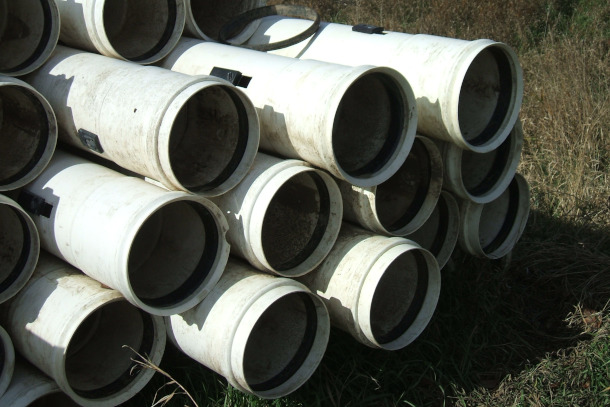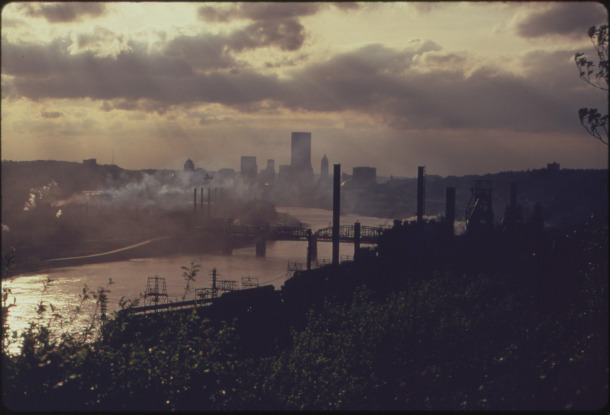Beyond the Headlines
Air Date: Week of June 9, 2023

Dupont and its spinoffs Chemours and Corteva have reportedly reached a $1.19 billion settlement over their alleged contamination of drinking water supplies with PFAS “forever” chemicals (Photo: US EPA, public domain)
This week, Living on Earth Contributor Peter Dykstra joins Host Steve Curwood to discuss the $1.19 billion settlement by Dupont and two spinoffs over PFAS “forever chemical” contamination of drinking water supplies. Also, while replacing lead pipes that carry drinking water into homes is essential for public health, the PVC pipes they’re often replaced with can leach toxins into the water. And in history, they look back to an 1804 declaration in Pittsburgh on the nuisance of coal smoke, a problem that would only intensify as the city became the steelmaking heart of America.
Transcript
CURWOOD: On the line now from Atlanta, Georgia is Living On Earth contributor Peter Dykstra, who often takes a look beyond the headlines for us. What do you see this week, Peter, and how you doing?
DYKSTRA: Doing alright Steve, and we're gonna look first at a $1.19 billion settlement by DuPont and two of its spin off companies Chemours and Corteva. Municipalities sued those companies for the presence of PFAS, those so called forever chemicals, in drinking water supplies. PFAS has the name forever chemicals, because they last, for all intents and purposes, forever in the human body. And they've been linked to liver disease, various forms of cancer and other illnesses that have brought a flurry of lawsuits not just against the DuPont companies, but others in this country and in Canada and in the EU and elsewhere.
CURWOOD: And it's not as if this was a mystery to these companies, right? I mean, their scientists, I believe, had told them some time ago, there might be a problem with these fluorinated compounds, which makes them so persistent. Those fluorine bonds are very tough.
DYKSTRA: Yeah, there are some sleuths at the University of California, that went back into industry archives to the 1970s and found evidence that these companies knew about the toxicity of PFAS chemicals and yet concealed the potential problems.
CURWOOD: Alright, what else do we have to talk about today, Peter?

About 9.2 million lead pipes deliver drinking water in the US. These pipes are largely being replaced by PVC and CPVC pipes that pose their own potential risks to the water supply. (Photo: John Lillis, Flickr, CC BY-NC-ND 2.0)
DYKSTRA: Well, we know in recent years that there's been a tremendous problem with lead pipes delivering drinking water, some of which are now being replaced. And the problem is in replacing many of those 9.2 million pipes into homes, they're using polyvinyl chloride pipes, PVC, and CPVC. Those are plastic pipes that are known to also leach other toxins into water systems and cause problems that could be as bad as those caused by lead pipes.
CURWOOD: What's the appropriate solution technologically?
DYKSTRA: Simple copper pipes, one of the other most common forms of drinking water pipes are believed to be much safer than either lead or PVC. That's what's advocated. And the other issue that opens up in all of this is, because so many of those lead and PVC pipes lead to homes in poor neighborhoods, it's an environmental justice problem as well and not just a simple health problem.
CURWOOD: Indeed. Let's take a look now back in history, and tell me what you see today.
DYKSTRA: June 10, 1804, when the city of Pittsburgh wasn't even a city yet, a Revolutionary War veteran and POW named Presley Neville was serving as the Burgess of the borough of Pittsburgh. And he wrote in 1804 about the general dissatisfaction in the city for the nuisance of coal smoke. This is before there was even a steel industry in Pittsburgh, and coal burned for heat in homes in the young community led Neville to say, quote, "The general dissatisfaction which prevails, as a consequence of the coal smoke compels me to address you on the situation." Address the community he did, but the problem just got worse when Pittsburgh became the steelmaking heart of America.

Pittsburgh, PA dealt with haze from industry for many years, but one of the earliest mentions of the “nuisance” of coal smoke in Pittsburgh came from Burgess Presley Neville in 1804. (Photo: John Alexandrowicz, Environmental Protection Agency, US National Archives, Public Domain)
CURWOOD: Yep, just down the road from a lot of coal easy to mine nearby and in a valley where the Allegheny the Monongahela and the Ohio rivers come together. Perfect place to trap bad air. All right, Peter. Well, thank you for all these items. Peter Dykstra is a Living on Earth contributor, and we will talk to you again real soon.
DYKSTRA: All right, Steve, thanks a lot. Talk to you soon.
CURWOOD: And there's more on these stories on the Living on Earth web page. That's loe.org.
Links
The New York Times | “Three ‘Forever Chemicals’ Makers Settle Public Waters Lawsuits”
Living on Earth wants to hear from you!
Living on Earth
62 Calef Highway, Suite 212
Lee, NH 03861
Telephone: 617-287-4121
E-mail: comments@loe.org
Newsletter [Click here]
Donate to Living on Earth!
Living on Earth is an independent media program and relies entirely on contributions from listeners and institutions supporting public service. Please donate now to preserve an independent environmental voice.
NewsletterLiving on Earth offers a weekly delivery of the show's rundown to your mailbox. Sign up for our newsletter today!
 Sailors For The Sea: Be the change you want to sea.
Sailors For The Sea: Be the change you want to sea.
 The Grantham Foundation for the Protection of the Environment: Committed to protecting and improving the health of the global environment.
The Grantham Foundation for the Protection of the Environment: Committed to protecting and improving the health of the global environment.
 Contribute to Living on Earth and receive, as our gift to you, an archival print of one of Mark Seth Lender's extraordinary wildlife photographs. Follow the link to see Mark's current collection of photographs.
Contribute to Living on Earth and receive, as our gift to you, an archival print of one of Mark Seth Lender's extraordinary wildlife photographs. Follow the link to see Mark's current collection of photographs.
 Buy a signed copy of Mark Seth Lender's book Smeagull the Seagull & support Living on Earth
Buy a signed copy of Mark Seth Lender's book Smeagull the Seagull & support Living on Earth

